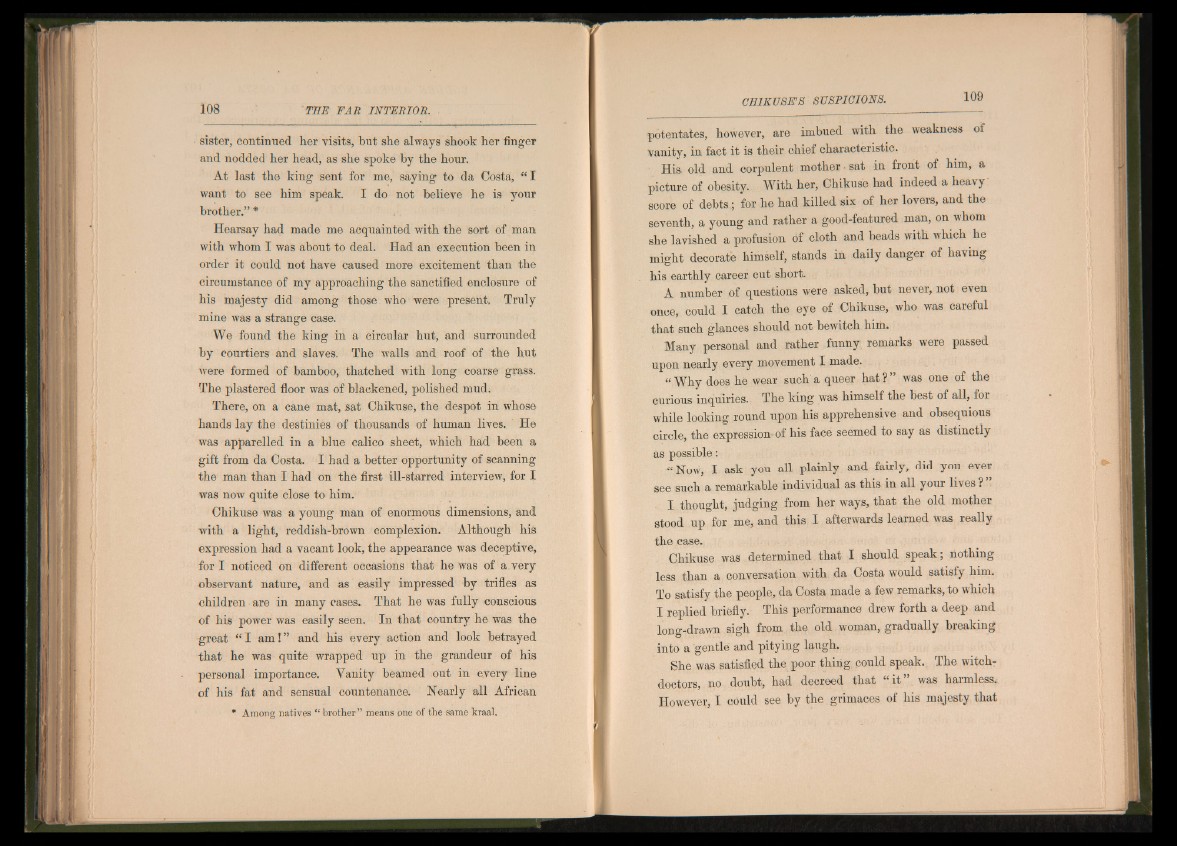
sister, continued her visits, but she always shook her finger
and nodded her head, as she spoke by the hour.
At last the king sent for me, saying to da Costa, “ I
want to see him speak. I do not believe he is your
brother.” *
Hearsay had made me acquainted with the sort of man
with whom I was about to deal. Had an execution been in
order it could not have caused more excitement than the
circumstance of my approaching the sanctified enclosure of
his majesty did among those who were present. Truly
mine was a strange case.
We found the king in a circular hut, and surrounded
by courtiers and slaves. The walls and roof of the hut
were formed of bamboo, thatched with long coarse grass.
The plastered floor was of blackened, polished mud.
There, on a cane mat, sat Chikuse, the despot in whose
hands lay the destinies of thousands of human lives. He
was apparelled in a blue calico sheet, which had been a
gift from da Costa, I had a better opportunity of scanning
the man than I had on the first ill-starred interview, for X
was now quite close to him.
Chikuse was a young man of enormous dimensions, and
with a light, reddish-brown complexion. Although his
expression had a vacant look, the appearance was deceptive,
for I noticed on different occasions that he was of a very
observant nature, and as easily impressed by trifles as
children are in many cases. That he was fully conscious
of his power was easily seen. In that country he was the
great “ I am !” and his every action and look betrayed
that he was quite wrapped up in the grandeur of his
personal importance. Vanity beamed out in every line
of his fat and sensual countenance. Nearly all African
* Among natives “ brother” means one of the same kraal.
CHIKUSE1 S SUSPICIONS. 109
potentates, however, are imbued with the weakness of
vanity, in fact it is their chief characteristic.
His old and corpulent mother sat in front of him, a
picture of obesity. With her, Chikuse had indeed a heavy
score of debts ; for he had killed six of her lovers, and the
seventh, a young and rather a good-featured man, on whom
she lavished a profusion 6f cloth and beads with which he
might decorate himself, stands in daily danger of having
his earthly career cut short.
A number of questions were asked, but never, not even
once, could I catch the eye of Chikuse, who was careful
that such glances should not bewitch him.
Many personal and rather funny remarks were passed
upon nearly every movement I made.
“Why does he wear such a queer h a t? ” was one of the
curious inquiries.- The king was himself the best of all, for
while looking round upon his apprehensive and obsequious
circle, the expression of his face seemed to say as distinctly
as possible:
“ Now, I ask you all plainly and fairly, did you ever
see such a remarkable individual as this in all your lives ?
I thought, judging from her ways, that the old mother
stood up for me, and this I afterwards learned was really
the case.
Chikuse was determined that I should speak; nothing
less than a conversation with da Costa would satisfy him.
To satisfy the people, da Costa made a few remarks, to which
I replied briefly. This performance drew forth a deep and
long-drawn sigh from the old woman, gradually breaking
into a gentle and pitying laugh.
She was satisfied the poor thing could speak. The witchdoctors,
no doubt, had decreed that “ i t ” was harmless*
However, I could see by the grimaces of his majesty that